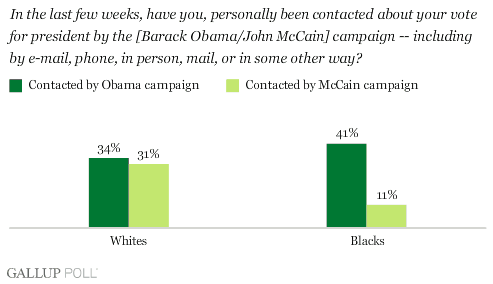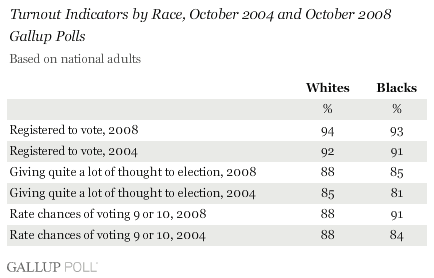PRINCETON, NJ -- Black voters are scoring highly this election season on several election interest and voting measures, and thus constitute a higher percentage of Gallup's projected likely voter pool than in previous elections. Additionally, blacks report having received election-related contact from the Obama campaign at a higher rate than do whites, although many fewer blacks have been contacted by the McCain campaign.
Campaign Contact
, blacks report having been contacted in disproportionately higher numbers by the Obama campaign than by the McCain campaign. While rates of contact by the Obama and McCain campaigns are similar among whites, blacks are almost four times as likely to report having been contacted by the Obama campaign as by the McCain campaign.

This high level of contact almost certainly reflects an effort by the Obama campaign to help encourage a record-high turnout of black voters -- more than 9 out of 10 of whom, based on ÆéûÜǨû§data, will pull the lever for Obama if they vote.
In fact, ÆéûÜǨû§analysis shows that blacks this year are just as likely as whites to report being registered to vote, and match the high levels of interest in the campaign and self-reported intention to vote seen among whites. The increase since 2004 on the latter two measures among blacks most likely reflects black voters' reaction to the candidacy of the first major-party black presidential nominee in U.S. history.

Blacks now make up a greater share of Gallup's likely voter pool (using the traditional model that takes into account past voting behavior) than they did in 2004. In Gallup's most recent update on likely voters, blacks constitute 11% of both the expanded and traditional likely voter group, higher than the 8% representation in Gallup's final estimate of voters from 2004. If these trends continue through the election next Tuesday, black turnout rates this year may approach or match turnout rates among whites.
Survey Methods
Results are based on telephone interviews with 2,279 national adults, aged 18 and older, conducted Oct. 10-12 and Oct. 23-26, 2008. For results based on the total sample of national adults, one can say with 95% confidence that the maximum margin of sampling error is ôÝ2 percentage points.
For results based on the sample of 203 black respondents, the maximum margin of sampling error is ôÝ7 percentage points.
Interviews are conducted with respondents on land-line telephones (for respondents with a land-line telephone) and cellular phones (for respondents who are cell-phone only).
In addition to sampling error, question wording and practical difficulties in conducting surveys can introduce error or bias into the findings of public opinion polls.
